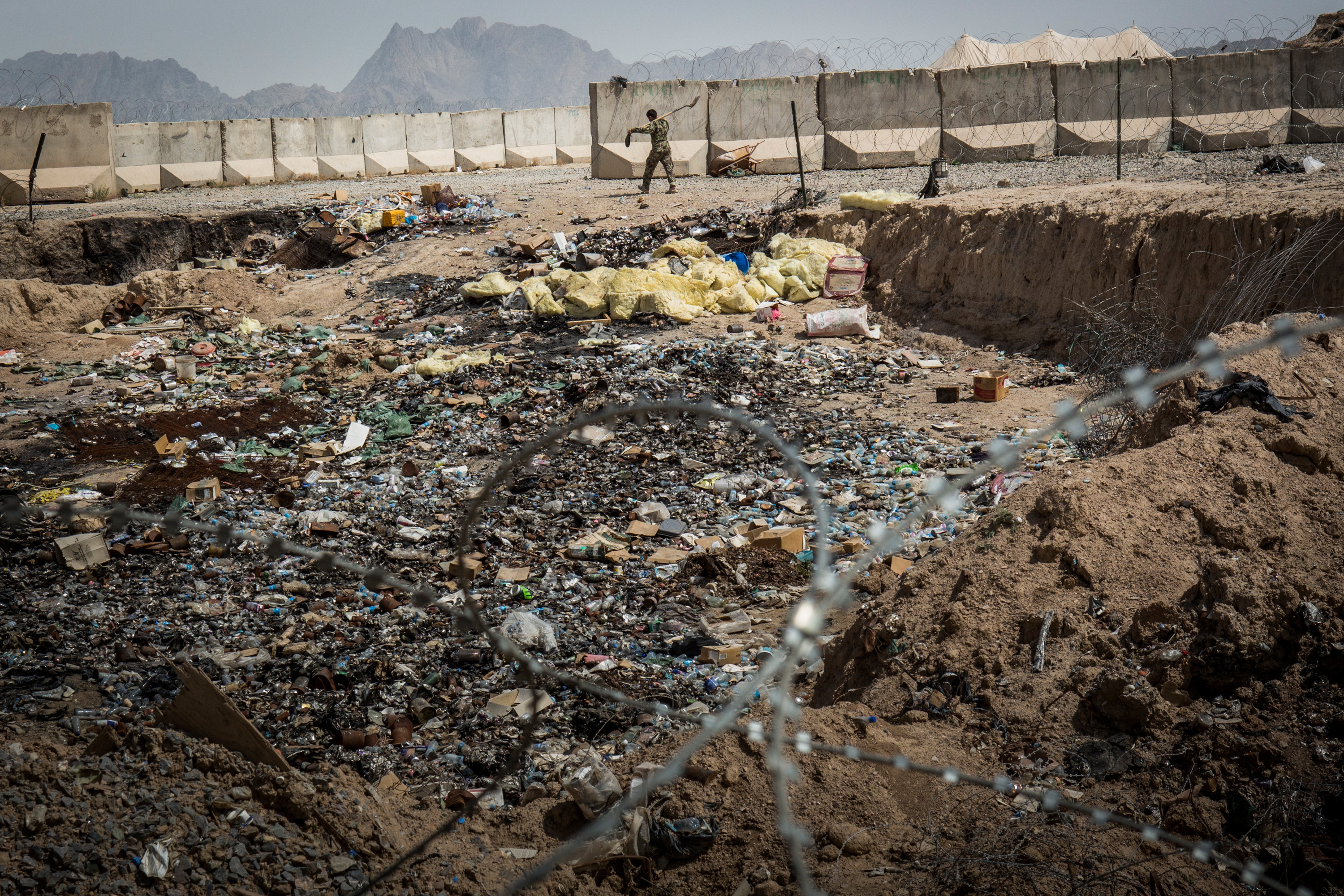Advocacy group: Iraq burn pits are still killing Iraqis, U.S. troops
Andrew Burton/Getty Images


A free daily email with the biggest news stories of the day – and the best features from TheWeek.com
You are now subscribed
Your newsletter sign-up was successful
Until Congress banned the practice four years ago, the U.S. military used burn pits to dispose of military waste. Activists say these burn pits have led to early deaths, birth defects, and the environmental poisoning of Iraq. On Wednesday, members of the group Right to Heal gathered in Washington to ask for help for thousands of people they say are suffering ill effects caused by the dark smoke from burning paint, rubber tires, munitions, chemicals, plastics, and metals.
The health problems have reportedly hit both Iraqis and members of the U.S. military. Kristi Casteel's son, Joshua, died from lung cancer in 2012 at the age of 32. While serving as an interrogator in Iraq for the Army, he lived roughly 100 yards from a burn pit, Casteel told a Right to Heal meeting. "While very aware of the thick black clouds that covered the base every day, and experiencing symptoms of congestion, burning eyes, and nausea at times," she said, "he, like most all the other soldiers, just labeled their symptoms the 'Iraqi crud.'"
A 2011 report from the Institute of Medicine determined there wasn't enough data to conclude whether or not pollution from the pits could cause long-term health problems, but acknowledged that chemicals found at the Joint Base Balad pit could eventually cause respiratory, heart, kidney, and liver problems, plus anemia and cancer. Right to Heal wants the U.S. to pay reparations to civilians who lived near the pits, and to help with environmental cleanup efforts.
The Week
Escape your echo chamber. Get the facts behind the news, plus analysis from multiple perspectives.

Sign up for The Week's Free Newsletters
From our morning news briefing to a weekly Good News Newsletter, get the best of The Week delivered directly to your inbox.
From our morning news briefing to a weekly Good News Newsletter, get the best of The Week delivered directly to your inbox.
A free daily email with the biggest news stories of the day – and the best features from TheWeek.com
Catherine Garcia has worked as a senior writer at The Week since 2014. Her writing and reporting have appeared in Entertainment Weekly, The New York Times, Wirecutter, NBC News and "The Book of Jezebel," among others. She's a graduate of the University of Redlands and the Columbia University Graduate School of Journalism.
-
 ‘Those rights don’t exist to protect criminals’
‘Those rights don’t exist to protect criminals’Instant Opinion Opinion, comment and editorials of the day
-
 Key Bangladesh election returns old guard to power
Key Bangladesh election returns old guard to powerSpeed Read The Bangladesh Nationalist Party claimed a decisive victory
-
 Judge blocks Hegseth from punishing Kelly over video
Judge blocks Hegseth from punishing Kelly over videoSpeed Read Defense Secretary Pete Hegseth pushed for the senator to be demoted over a video in which he reminds military officials they should refuse illegal orders
-
 British warship repels 'largest Houthi attack to date' in the Red Sea
British warship repels 'largest Houthi attack to date' in the Red SeaSpeed read Western allies warn of military response to Iranian-backed Yemeni rebels if attacks on ships continue
-
 Houthi rebels claim Red Sea ship attacks
Houthi rebels claim Red Sea ship attacksspeed read Iran-backed Yemeni group vows to escalate aggression towards Israel-linked vessels in revenge for Gaza war
-
 Israel plans next phase of Gaza war as first hostages released
Israel plans next phase of Gaza war as first hostages releasedSpeed read After four-day ceasefire 'we will not stop' until destruction of Hamas, says Israel
-
 Mob storms Russian airport 'looking for Jews'
Mob storms Russian airport 'looking for Jews'Speed Read Plane from Israel surrounded by rioters chanting antisemitic slogans after landing in Russia's Dagestan region
-
 Tuberville's military promotions block is upending lives, combat readiness, 3 military branch chiefs say
Tuberville's military promotions block is upending lives, combat readiness, 3 military branch chiefs saySpeed Read
-
 Ukraine's counteroffensive is making incremental gains. Does it matter in the broader war?
Ukraine's counteroffensive is making incremental gains. Does it matter in the broader war?Speed Read
-
 US commissions first-ever Navy ship in a foreign port
US commissions first-ever Navy ship in a foreign portSpeed Read
-
 British spy chief, Wagner video suggest Prigozhin is alive and freely 'floating around'
British spy chief, Wagner video suggest Prigozhin is alive and freely 'floating around'Speed Read
